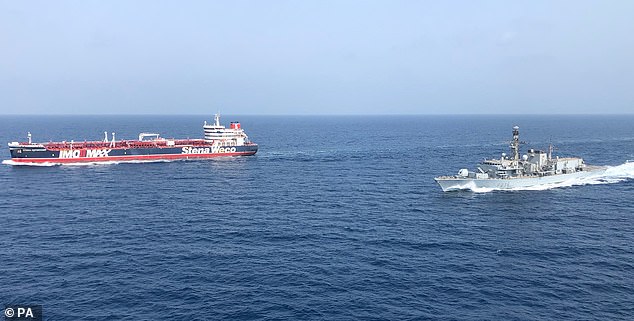August 9, 2019

In a startling announcement, China has said it might join a proposed US naval force dedicated to escorting tankers through the Strait of Hormuz.
“We are studying the US proposal on [Persian] Gulf escort arrangements,” the Chinese embassy in the UAE said in a text message August 6.
The United States last month proposed a naval task force to escort tankers entering and leaving the Persian Gulf. So far, only Britain has said it will join. And only China, Australia and Japan have publicly said they are thinking about it, although the United States has said many other nations have privately told Washington they are thinking about it and about 30 countries sent people to US Central Command headquarters early in August to hear US officials describe the plan.
If China were to join, it would be an astounding development and amount to a repudiation of the Islamic Republic.
Chinese naval ships have joined the anti-piracy patrols off Somali that are run under UN aegis, but they have never joined a naval force sponsored by the US.
Britain signed up after Boris Johnson became prime minister last month. Before that, Britain had been trying to organize a European naval escort group. But that went nowhere and Johnson appears to have shelved the idea and opted to work with the Americans.
Japan told US Defense Secretary Mark Esper that it would consider his request to join the group. Esper made the offer while on a visit to Tokyo. But few expect Japan to have anything to do with it. Japan News said, however, that Tokyo is thinking of sending some warships to the Persian Gulf to escort Japanese tankers outside any US operation. Japan and other countries have been ridiculed by President Trump for enjoying the protections of the US military while contributing little or nothing. That has embarrassed Japan, which gets most of its oil from the Persian Gulf. But, at the same time, Japanese officials fear Tehran would take offense if Japan actually joined the US-led group.
Britain routinely keeps one warship in the Persian Gulf. English news reports have reported that it has sent a second ship and will later send a third ship there. But the second ship was sent to replace the first and the third ship will sail to the Persian Gulf at the end of the year to replace the second.
This doesn’t give the British much firepower—or even escort power. The UK is sending a supply ship to the Persian Gulf so it can supply the warship and enable it to stay around the Strait of Hormuz longer, without having to seek a port to stock up.
British officials have asked British-flagged vessels to give 24-hours’ notice of their plans to transit the Strait of Hormuz. British officials have revealed that the Stena Impero, which was taken captive by Iran last month, only gave the Royal Navy one hour’s notice that it was entering the strait. The sole British warship was an hour away and could not reach the tanker before it was taken captive. The Islamic Republic acted when it knew it had nothing to fear from the Royal Navy.
But even if the Royal Navy provides an escort through the strait, it has no naval power to look after British-flagged vessels once they sail farther north in the Persian Gulf.
France has one warship on station in the Persian Gulf. It operates separate from the US and British vessels. No other outside power has any warship currently in the Persian Gulf.
Germany has publicly and loudly said it won’t join any American naval force in the Persian Gulf.
Iran slammed Israel August 9, saying Iran would defend itself from Israel’s ships joining the US force. But Israel never said it would send any ships to the Persian Gulf. All it said was that it would support the international force with intelligence information.
Historically, foreign navies have speedily lined up to join US Navy task forces patrolling hot spots in waters around the world. The large scale silence this time shows the disdain with which much of the world receives President Trump. Military leaders around the world still trust the US military—but they do not trust its commander-in-chief and they clearly prefer to keep their distance this time.
Robert Malley, who was on the staff of the White House National Security Council under President Barack Obama and is now the director of the Brussels-based International Crisis Group, said, “In ordinary times, there would have been a positive response. But now there is a fear of being seen as too closely associated with the United States.”
The Europeans calculate that any such overt sign of going with Washington against Iran would put an end to their efforts to keep Iran in the nuclear deal.
